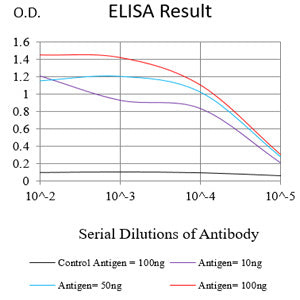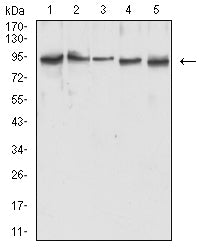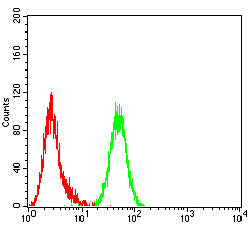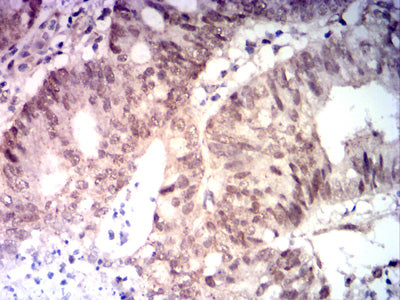




| WB | 1/500 - 1/2000 | Human,Mouse,Rat |
| IF | 咨询技术 | Human,Mouse,Rat |
| IHC | 1/200-1/1000 | Human,Mouse,Rat |
| ICC | 技术咨询 | Human,Mouse,Rat |
| FCM | 1/200-1/400 | Human,Mouse,Rat |
| Elisa | 1/10000 | Human,Mouse,Rat |
| Aliases | FCC2; COCA2; HNPCC; hMLH1; HNPCC2 |
| Entrez GeneID | 4292 |
| clone | 2B1C5 |
| WB Predicted band size | 84.6kDa |
| Host/Isotype | Mouse IgG1 |
| Antibody Type | Primary antibody |
| Storage | Store at 4°C short term. Aliquot and store at -20°C long term. Avoid freeze/thaw cycles. |
| Species Reactivity | Human |
| Immunogen | Purified recombinant fragment of human MLH1 (AA:381-483) expressed in E. Coli. |
| Formulation | Purified antibody in PBS with 0.05% sodium azide |
+ +
以下是3篇关于MLH1抗体的代表性文献摘要(注:文献信息为示例性简化内容,实际引用需核实原文):
1. **文献名称**:*"MLH1 Immunohistochemistry in Lynch Syndrome Screening"*
**作者**:Lindor NM, et al.
**摘要**:该研究评估MLH1抗体(克隆号G168-728)在结直肠癌组织中的表达,发现其可用于筛查Lynch综合征。MLH1蛋白缺失与错配修复基因突变相关,但需结合MLH1启动子甲基化检测以区分散发性病例。
2. **文献名称**:*"Comparison of MLH1 Antibody Clones for Diagnostic Use"*
**作者**:Shia J, et al.
**摘要**:对比两种MLH1抗体克隆(ES05 vs. G168-15)的性能,发现ES05在福尔马林固定组织中灵敏度更高,适用于检测MLH1表达缺失,尤其在微卫星不稳定性(MSI)肿瘤中的诊断一致性达95%。
3. **文献名称**:*"MLH1 Promoter Methylation and Protein Loss in Endometrial Cancer"*
**作者**:Mills AM, et al.
**摘要**:研究显示,子宫内膜癌中MLH1抗体(克隆M1)的免疫组化阴性结果与启动子甲基化高度相关,支持MLH1抗体作为初筛工具,后续需通过分子检测确认甲基化状态以指导遗传咨询。
如需具体文献,建议通过PubMed或Web of Science检索关键词“MLH1 antibody”、“immunohistochemistry”及“Lynch syndrome”获取最新研究。
The MLH1 antibody is a crucial tool in molecular pathology and cancer research, primarily targeting the MLH1 protein encoded by the *MLH1* gene. This gene is a key component of the DNA mismatch repair (MMR) system, which corrects replication errors to maintain genomic stability. MLH1 forms a heterodimer with PMS2 (MutL homolog 1-PMS2 endonuclease complex) to recognize and repair mismatched base pairs during DNA replication.
Defects in MLH1. often due to mutations or epigenetic silencing (e.g., promoter hypermethylation), disrupt MMR function, leading to microsatellite instability (MSI) and an increased risk of cancers. Germline *MLH1* mutations are associated with Lynch syndrome, an inherited condition predisposing to colorectal, endometrial, and other cancers. Somatic MLH1 inactivation is common in sporadic cancers, particularly colorectal and endometrial carcinomas.
In clinical diagnostics, MLH1 antibodies are used in immunohistochemistry (IHC) to assess MLH1 protein expression in tumor tissues. Loss of nuclear MLH1 staining helps identify MMR-deficient tumors, guiding Lynch syndrome screening and informing prognosis. MLH1-deficient tumors may respond differently to therapies, such as immune checkpoint inhibitors, which show efficacy in MSI-high cancers. However, MLH1 loss alone cannot distinguish Lynch syndrome (germline mutation) from sporadic cases (often due to methylation), necessitating complementary tests like *BRAF* mutation analysis or methylation-specific PCR. This underscores the antibody's role in precision oncology and hereditary cancer risk assessment.
×